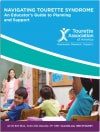Information about Tourette Syndrome for Education Professionals

Tourette Syndrome (TS) can affect a child’s experience at school. For example, some tics make it difficult to read or write. A child might also get distracted by tics or by trying not to have a tic. In addition, because many people do not understand TS, children are sometimes teased, bullied, or rejected by other kids. However, with some planning, children with TS can have a positive, successful school experience.
Generally, children with TS have the same intelligence range as other children. But problems with tics, often combined with attention deficits and other learning difficulties, can mean that children with TS will need special education assistance. Examples of this type of assistance might include different seating arrangements, additional time for testing or computer accommodations for children who have problems with writing.
Educators and other school personnel can support children with TS and their families by learning more about the condition. Information and education about specific strategies that can be used in school are available to help students with TS reach their full potential.
Education and Training
The Tourette Association of America provides information and education that is intended for educators and other school personnel. Following are links to some of this information:
The Tourette Association also provides live education programs for teachers and other education professionals.
The programs provide information on TS and related conditions, on accommodations and functional behavioral assessment for students with TS, and on writing a positive behavior support plan or an individualized education program (IEP) for a student with TS and related conditions.
Prevent Bullying
Children with TS and related co-occurring conditions (such as attention-deficit/hyperactivity disorder (ADHD)) are often victims of bullying by their peers. These children might be more of a target because they often stand out from other children, and their tics, obsessions, compulsions, or hyperactivity might single them out from their peers.1
Children with tics are more likely to be bullied than children without tics, and those with more severe tics are at even greater risk for being bullied. Among children with tics, bullying has been associated with loneliness and anxiety.2
Bullying can threaten the safety of students and disrupt their ability to learn. School staff can help by addressing bullying, or preventing it before it starts.
More information about bullying for schools, educators, parents, kids, and teens »
References
- Great Ormond Street Hospital for Children NHS Trust [Internet]. London; February 2007 [cited 2010 June 23]. Tourette Syndrome and bullying at school.
- Storch, EA, Chase, RM, Keeley, M, Goodman, WK, Murray, M, Geffken, GR. Peer victimization in youth with Tourette’s Syndrome and chronic tic disorder: Relations with tic severity and internalizing symptoms. Journal of Psychopathology and Behavioral Assessment. 2007; 29(4): 211-9.
